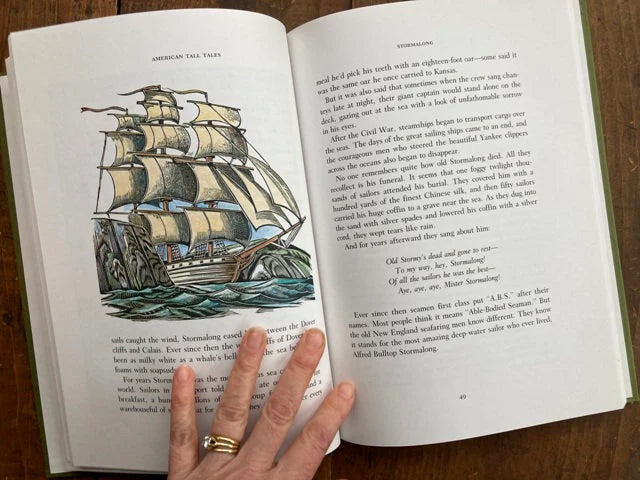New England has long been a region steeped in a rich tradition of storytelling. From the early settlers who passed down their tales through generations to the famous writers, poets, and comedians who emerged from this land, storytelling has been an integral part of the New England culture. In this blog, we will delve into the captivating history of storytelling in New England, exploring the influence of renowned writers, the lyrical expressions of poets, and the art of embellishing stories with tall tales, all of which continue to shape the vibrant narrative tapestry of the region.
Early Storytelling Traditions in New England
Long before European settlers arrived, the Native American tribes of New England had a rich tradition of oral storytelling. Through myths, legends, and folklore, they passed down their history, beliefs, and cultural knowledge from one generation to the next.
With the arrival of English settlers in the 17th century, storytelling took on a different tone in New England. The Puritans used storytelling to convey moral lessons, religious teachings, and historical accounts, often intertwining their personal experiences with religious allegories.
The infamous Salem Witch Trials in the late 17th century left a lasting impact on New England's storytelling. The tragic events of this era became a wellspring of eerie tales and ghost stories, reflecting the fears and anxieties of the time.
Renowned Writers and Their Contributions
Nathaniel Hawthorne: One of New England's most celebrated writers, Hawthorne is renowned for his dark and symbolic tales. His works, such as "The Scarlet Letter" and "The House of the Seven Gables," explored complex themes of guilt, sin, and the human condition, leaving an indelible mark on American literature.
Washington Irving: Although Irving hailed from New York, his legendary tale "The Legend of Sleepy Hollow" has become synonymous with the ghostly folklore of New England. His imaginative storytelling continues to inspire generations of writers and storytellers.
Edgar Allan Poe: Born in Boston, Poe was a master of Gothic fiction and poetry. His haunting tales, such as "The Tell-Tale Heart" and "The Fall of the House of Usher," influenced the development of horror and suspense storytelling in New England and beyond.
Poetic Expressions of New England
Emily Dickinson: Known for her enigmatic and evocative poetry, Emily Dickinson hailed from Amherst, Massachusetts. Her introspective verses captured the beauty of nature, the complexities of the human soul, and the essence of New England life.
Robert Frost: A quintessential New England poet, Robert Frost celebrated rural life and nature in his works. His poems, including "The Road Not Taken" and "Stopping by Woods on a Snowy Evening," are cherished for their contemplative themes and lyrical quality.
Ralph Waldo Emerson: As a prominent essayist and poet, Emerson was a leading figure of the transcendentalist movement in New England. His philosophical and spiritual musings influenced generations of writers and thinkers, shaping the region's literary landscape.
Tall Tales and Passionate Retelling
New Englanders are renowned for their flair in embellishing stories with vivid details, humor, and colorful characters. This tradition of storytelling is deeply ingrained in the region's culture and often manifests in the form of tall tales.
Perhaps the most famous tall tale character in New England folklore, Paul Bunyan, the giant lumberjack, and his blue ox, Babe, became legendary figures symbolizing the region's rugged landscape and industrious spirit.
The mythical figure of Johnny Appleseed, based on the real-life John Chapman, also became a beloved character in New England storytelling. Tales of his kindness and generosity in planting apple orchards were shared with awe and admiration.
The distinctive Yankee dialect, with its unique phrasing and sayings, adds flavor to New England storytelling. The region's comedians, such as Bob Newhart and Stephen Colbert, have masterfully woven the New England wit into their performances, entertaining audiences worldwide.
The Enduring Legacy of New England Storytelling
While modern technology and digital media have changed the ways stories are shared, New England's oral tradition continues to thrive. Storytelling events, festivals, and gatherings pay homage to the region's rich storytelling heritage.
New England hosts numerous literary festivals and workshops that celebrate the art of storytelling and foster the development of emerging writers and poets.
Storytelling in New England serves as a means of connecting communities and preserving local history and culture. It fosters a sense of belonging and shared identity among the people of the region.
From the oral traditions of Native Americans and Puritans to the enduring works of esteemed writers and poets, storytelling in New England has evolved into a captivating tapestry of imagination, wisdom, and passion. The influence of renowned writers like Hawthorne, Irving, and Poe, coupled with the poetic expressions of Dickinson, Frost, and Emerson, has left an indelible mark on American literature. The art of embellishing stories with tall tales, along with the unique Yankee wit and dialect, continues to captivate audiences, generating laughter and admiration. Through the ages, storytelling in New England has remained a cherished tradition, weaving together the threads of history, culture, and shared experiences, and it continues to be a vibrant and treasured aspect of the region's identity.

